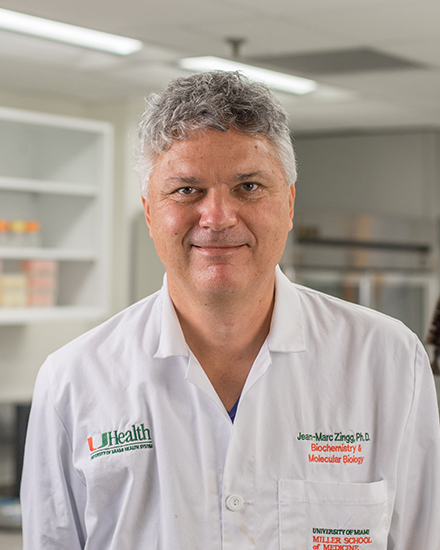
Contact
Email: jaz42@miami.eduRoles
Research Associate Professor
Primary Appointment of Biochemistry and Molecular Biology
-
Biography
1988 Diploma/Master in Biology II (Biocenter, University of Basel, Switzerland)
1993 PhD in Biochemistry and Molecular Biology (Biocenter, University of Basel, Switzerland)
2005 Habilitation (Private Lecturer) in Biochemistry and Molecular Biology, Medical Faculty, University of Bern, Switzerland
Academic:
1984-1988: Study of Biology II, Biocenter of the University of Basel, Switzerland
1987-1988: Diploma/Master Thesis: Biocenter of the University of Basel, Switzerland, Group of Prof. W. Arber “Characterisation of four late promoters of phage P1 and plasmid p15B”
1989-1994: PhD Thesis: Friedrich Miescher Institute (FMI) for Biomedical Research, University of Basel, Switzerland, Group of Dr. J. P. Jost “Characterization of the mouse MyoD1 structural gene and its promoter region”
Professional:
1994-1997: Postdoctoral fellow: USC/Norris Cancer Center, University of Southern California, Los Angeles, USA, Group of Prof. P. A. Jones, “Role of DNA methylation in carcinogenesis”
1997-2006: Assistant and Oberassistent (equivalent to Assistant Professor, since 2001): Institute of Biochemistry and Molecular Medicine, University Bern, Switzerland, Group of Prof. A. Azzi,
Vitamin E, vitamin E transport proteins, atherosclerosis, neurodegeneration, cancer, vascular smooth muscle and mast cells, monocytes/macrophages, signal transduction, gene expression regulation
2007-2014: Visiting Scientist/Scientist II; Vascular Biology Laboratory, JM USDA-Human Nutr. Res. Ctr. On Aging (HNRCA), Tufts University, Boston, USA, Group of Prof. M. Meydani, Regulatory role of micronutrients (curcumin) and vitamin E analogues and derivatives on signal transduction (AKT/PI3K) and gene expression (CD36/VEGF) in monocytes/macrophages, mast cells, adipocytes, and vascular smooth muscle cells and their impact on atherosclerosis and inflammation
2014- Scientist/Research Associate Professor, Department of Biochemistry and Molecular Biology, Biomolecules and Bionanotechnology, Miller School of Medicine, University of Miami, Florida, USA, Group of Prof. S. Daunert,
Nanocarriers for vitamin E and other compounds and regulatory activity; Modulation of foam cell formation by vitamin E nanocarriers and relevance for inflammatory diseases; Methods for detection and diagnosis of emerging pathogens (Human Papilloma virus (HPV), Zika virus, SARS-CoV-2 (COVID-19)); Development of biosensors for environmental molecules; quorum sensing and positional sensing relevant for bacterial biofilm formation -
Education & Training
Education
-
Honors & Awards
No result found
-
Teaching Interests
Nutrition, Micronutrients, Vitamins -
Research Interests
Point-of-Care Tests for emerging pathogens. We are developing novel molecular Point of Care (PoC) methods required for detection of emerging pathogens (e.g., Flavi virus (Zika), Coronavirus (SARS-CoV-2) and human papilloma virus (HPV)) that are low-cost and do not require extensive equipment. Simple sample collection and purification is followed by isothermal amplification (e.g., rolling circle amplification (RCA), recombinase polymerase amplification (RPA)), after which the amplified product is captured and colorimetrically detected by lateral flow assay.
Positioning Biosensors. We are constructing Whole Cell Biosensors that allow to monitor bioluminescent gene expression in bacterial biofilms. When these bacteria are grown on agar plates at various densities, they express bioluminescence not only in a density- but also in a position-dependent manner (quorum sensing (QS) and positional sensing (PS), respectively). The use of bioluminescence in QS and PS promises to reveal important regulatory circuits and communication systems relevant for bacterial normal physiology, pathogenicity and virulence.
Lipid homeostasis, inflammation and senescence. We are investigating the molecular and cellular mechanisms by which micronutrients and vitamins regulate signal transduction and gene expression relevant for lipid homeostasis, inflammation, and senescence. We develop methods by which the delivery of micronutrients and vitamins can be enhanced by nanocarriers and investigate their impact on atherosclerosis, inflammation, and skin health.
Molecular mechanisms of mast cell tumor development. We have identified a canine mast cell tumor with a mutated c-kit tyrosine kinase receptor caused by aberrant splicing. Interestingly, the same mutation occurs in human gastrointestinal stromal tumors (GIST) and the molecular mechanisms by which it is generated are investigated. -
Publications
Disclaimer: The information presented in this section has been consolidated using AI and machine learning technologies. While every effort has been made to ensure accuracy, errors may occur. If you identify any inaccuracies, please use this link to inform our data team. Your feedback is greatly appreciated and helps us improve the quality of our content.
-
Copyrights & Patents

